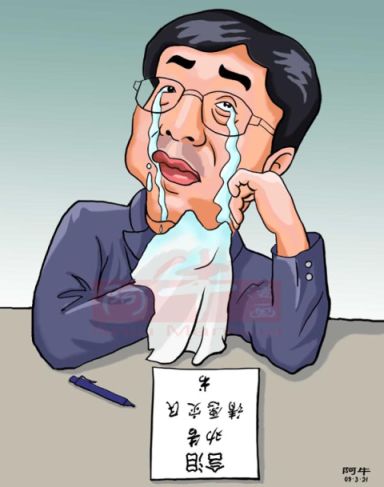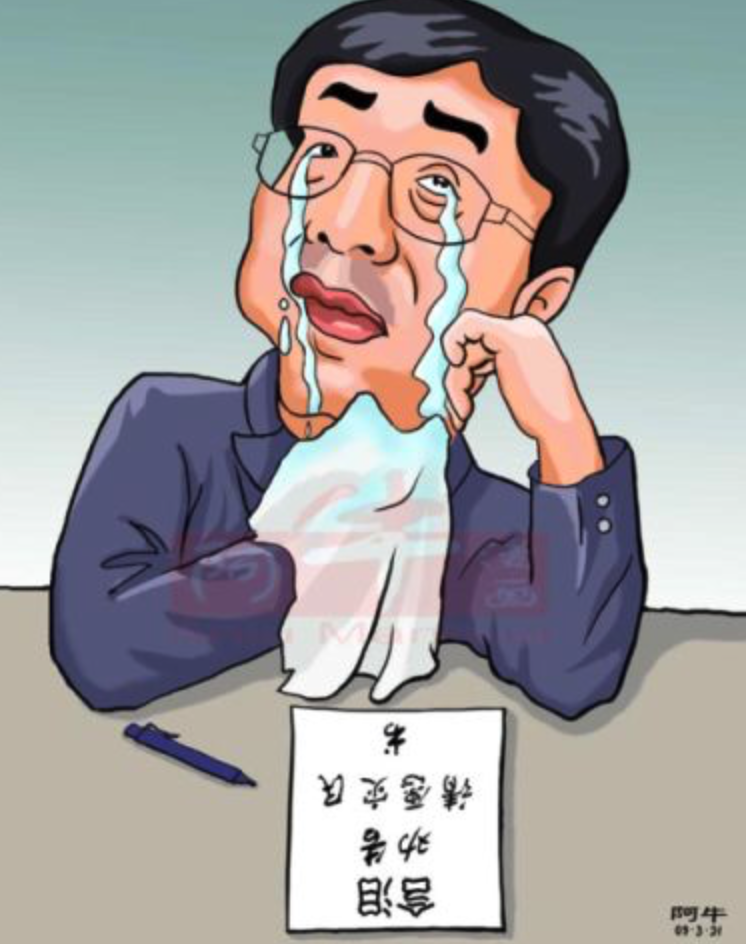The Word of the Week comes from the Grass-Mud Horse Lexicon, a glossary of terms created by Chinese netizens and encountered in online political discussions. These are the words of China’s online “resistance discourse,” used to mock and subvert the official language around censorship and political correctness.
hánlèi quàngào 含泪劝告

Yu Qiuyu with a copy of his inflammatory essay. (Artist: Ah Niu 阿牛)
Infamous appeal to victims of the 2008 Sichuan earthquake to stop complaining about the shoddy construction of schools, which led to the deaths of thousands of school children.
The 7.9-magnitude earthquake that struck mountainous Wenchuan County, Sichuan on May 12, 2008 claimed the lives of over 5,000 children, whose poorly built “tofu dregs” schools collapsed on them. Government buildings weathered the quake far better. Angry parents were begged to stop protesting. Some were detained at the scene or at protests, while others called off memorials following official warnings.
A month after the quake, literary figure Yu Qiuyu penned the essay “A Tearful Request for the Earthquake Survivors” (含泪劝告请愿灾民), in which he implored parents to stop their protests. He suggested the parents were being used by those with “ulterior motives” and by “anti-Chinese forces.” Many netizens accused Yu of trying to protect the corrupt politicians and contractors whose greed and negligence had led to so many deaths. Some “tearfully urged Yu Qiuyu to jump in a river” (含泪劝告余秋雨去投江).
Angered by the criticism and the parodies of his essay, Yu wrote a reply to his critics, “You Are Not Permitted to Continue Insulting the Chinese People” (不准继续侮辱中国人).
Blogger Huang Lin has written an exposition on the “fashion of the tearfully urging writing style.”
Artist Ai Weiwei lead an effort to collect the names of the schoolchildren, resulting in the performance piece “Commemoration.” He and the volunteers who came with him to Sichuan faced police harassment. Ai also created an installation spelling out a quote from one grieving mother—”she lived happily on this earth for seven years”—using 9,000 student backpacks. The activist Tan Zuoren served a five-year sentence for “inciting subversion of state power” after he tried to compile a list of the children’s names.
In the lead-up to the 10th anniversary of the deadly quake, Wenchuan County officials announced that May 12, 2018 would be declared a day of “thanksgiving” for government rebuilding efforts over the previous decade. This announcement drew scorn from Chinese web-users who felt that a day of memorial for the many thousands of lives lost would be far more appropriate. The New York Times’ Tiffany May reports:
After Wenchuan County officials announced the day of thanksgiving to mark the anniversary on Saturday, the state news media described “beautiful, tidy buildings” that now populate the most ravaged disaster zone. The report noted that local residents often expressed their indebtedness for the “gushing springs of generosity” they had received — a sentimental adage.
[…] “Everyone knows that the earthquake killed tens of thousands of people on that day, and yet you call it ‘Thanksgiving Day,’” a Weibo user said. “What do we give thanks for?”
“Can’t it be called ‘Memorial Day?’” another user asked. “Gratitude at the tip of the tongue is the most hypocritical way of giving thanks.”
Others suggested alternative names for the anniversary: “Day of the Earthquake Victims,” “Day of Suffering” and even “Day of Shame.” [Source]
In an interview with CDT, historian Jeremy Brown explained that “handling” of grieving parents is a common pattern following “sudden incidents.” After the deaths of 288 schoolchildren in the 1994 Karamay fire, for example, parents “became targeted as troublemakers and came under surveillance themselves.”
The Party’s definition of tufashijian includes three things: accidents, natural disasters, and protests, or political disturbances. The Party has decided to put these three things together. I think that’s also a case of “lesson not learned” from all the targeting of families and accident victims that we’ve seen throughout the Mao period and continuing into today. There’s an automatic assumption by putting those things together that these are threats to the stability of the Communist Party, and so they need to be handled in the same way. Instead of being transparent, or treating accident victims compassionately, the impulse is to cover it up, and target them for surveillance and crackdowns. Because that’s what you do to a protest, right?
I think there’s a recognition by putting natural disasters in the same category as accidents that the Party’s going to be judged based on its handling of it, and that people are going to make the links between infrastructure and casualty patterns. [Source]
See also even the destruction is a blessing.
Can’t get enough of subversive Chinese netspeak? Check out our latest ebook, “Decoding the Chinese Internet: A Glossary of Political Slang.” Includes dozens of new terms and classic catchphrases, presented in a new, image-rich format. Available for pay-what-you-want (including nothing). All proceeds support CDT.







